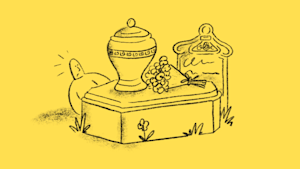

How to arrange a funeral
When it comes to arranging a funeral, most people start by looking for local funeral directors. But actually, you could create a far more personal memorial for a fraction of the cost with a simple, direct cremation.
Choose what type of funeral you want
Burial or cremation? Traditional service or something more personalised? There are many different types of funeral to choose from. So when it comes to putting funeral plans in place, the first thing to think about is what your loved one would have wanted. Many families find it uncomfortable to talk about this kind of thing, but you may be able to find details of their funeral wishes in their will.
If your loved one didn't write a will, or you're planning ahead to help your family organise your own funeral ceremony, you’ll want to start by finding out about the different types of funeral available in the UK. Here are the most popular options:
1. Traditional burial
A traditional burial is the kind of ceremony most people imagine when they think about arranging a funeral. This begins with a viewing or visitation at a church, funeral home or other event space, allowing family and friends to say goodbye and pay their respects.
This is then followed by a formal funeral ceremony, which may include prayers, readings, eulogies and music. At the end of the ceremony, the body is transported to the cemetery and the burial is then witnessed by family and friends. There may also be a funeral reception as part of this service.
2. Natural burial
A natural burial, also known as a green burial, is an eco-friendly option that's gained a lot of popularity in recent years. Unlike the urban setting of most funerals, a natural burial takes place in a woodland conservation space.
This type of funeral requires a biodegradable coffin or shroud for the body to be buried in. It also prohibits the marking or creation of a grave site. Instead, the whole field or park is intended to act as a memorial ground for those buried there, rather than the plot itself.
3. Traditional cremation
A traditional cremation is similar to a traditional burial in that it begins with a viewing or visitation and is then followed by a formal funeral service. This usually takes place in a crematorium or funeral home.
Typically, the cremation itself happens after the ceremony and is not witnessed by friends and family. The ashes are then returned to the family in an urn, and can either be displayed, buried in a cemetery or scattered at a place of your choosing.
4. Direct cremation
Direct cremation has been a great low-cost funeral option for many years, but it gained particular popularity in 2016 after David Bowie pre-arranged to have one after his death.
What’s a direct cremation? In short, it’s a simple way of obtaining your loved one’s ashes without needing to have a formal, traditional ceremony.
Your loved one is collected from their place of death and taken to a crematorium for a private, unattended cremation. This gives you the time and freedom to put your own funeral plans in place with your family. The ashes are then returned to you in a beautiful, temporary urn, so you can choose to display them or scatter them in a place of your choosing.
Work out how much the funeral will cost
The average cost of a funeral in the UK varies depending on the type of service you want – so it’s worth setting a budget that you and your family are comfortable with up front. Below, you can see how the average cost differs between a burial, traditional cremation and direct cremation.
How much does a burial cost?
The average cost of a burial is around £4,250 for a basic package. However, between choosing a coffin, picking out transportation and arranging catering for the reception, families can often find themselves spending much more.
How much does a cremation cost?
The average cost of a traditional cremation is £3,250. This covers all the basics like the funeral directors, crematorium and funeral service. But again, costs can escalate for things like transportation and your choice of coffin.
Alternatively, you can get a direct cremation for a fixed upfront price of £1,095. By taking care of the cremation for a much lower cost, you have more left over to set up your own funeral plans with family and friends.
Decide where to have the funeral
If you’re arranging a funeral through your local funeral directors, you probably won’t have much choice over where the memorial service is held. But if you decide to have a direct cremation, there are a wealth of options to choose from. Here are a few ideas of how you can celebrate your loved one’s life after having a direct cremation:
Hire out your local town hall for a memorial with family and friends
Host a gathering at your house where everyone can share memories in a relaxed setting
Go to your loved one’s favourite beauty spot to raise a glass in their honour
Take a day out with close family and scatter their ashes by the sea
How to arrange a direct cremation
If you’ve recently lost a loved one and are interested in arranging a direct cremation, call Farewill Cremation today on 0203 695 2090. We’ll take everything out of your hands so you can spend more time creating a fitting memorial for your loved one.
Did you know Farewill can also help with probate? Find out more about our probate service here.
Thinking about recording your own funeral wishes in your will? Find out how to make a will here.